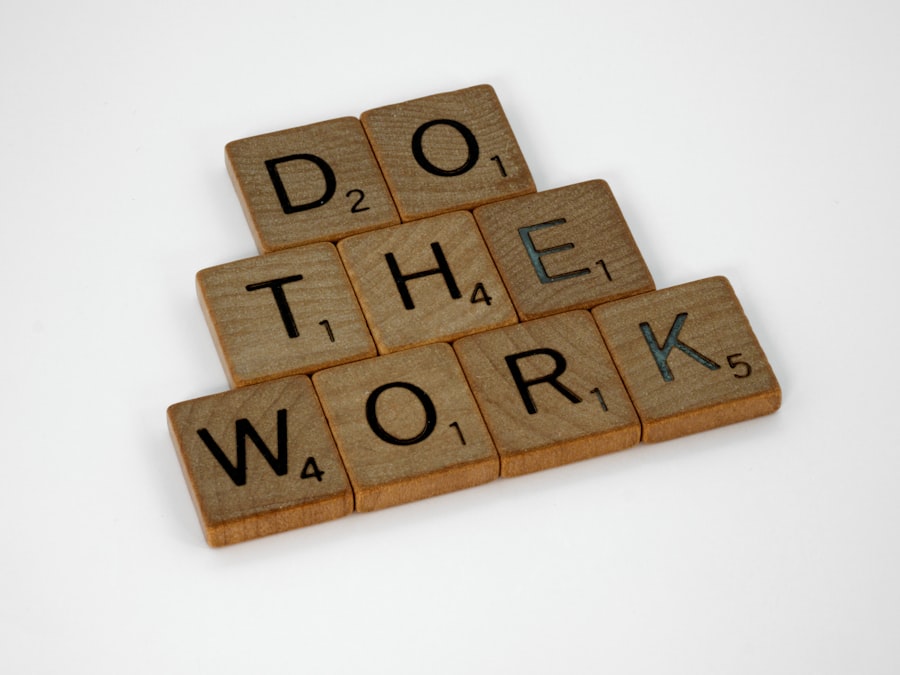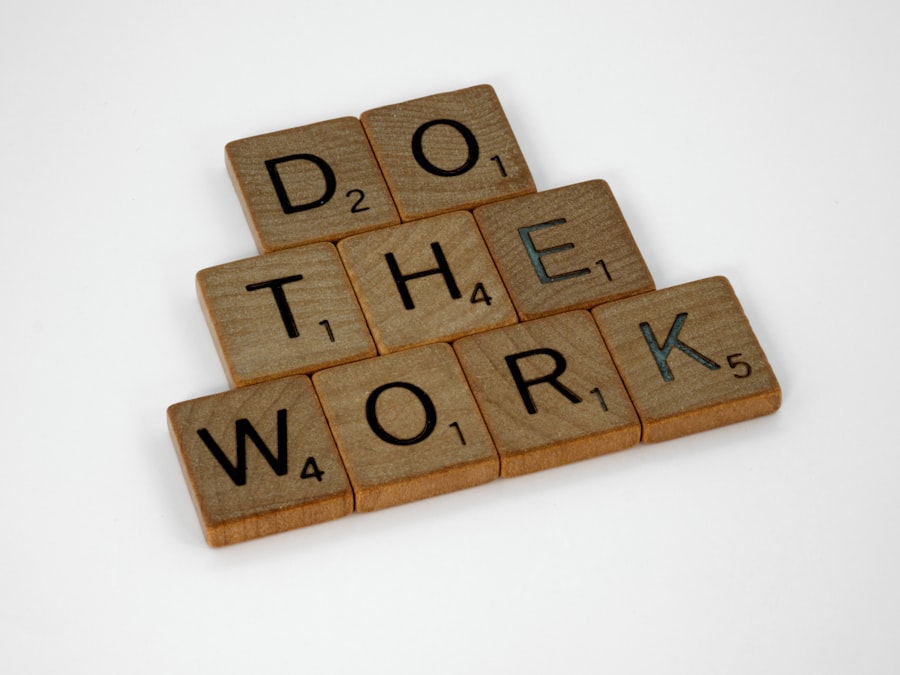Deep work is a concept that emphasizes the importance of focused, uninterrupted work sessions that allow you to produce high-quality results. In a world filled with distractions, the ability to engage in deep work is becoming increasingly rare yet essential. You may find that when you immerse yourself in a task without interruptions, your productivity skyrockets, and your creativity flourishes.
This state of deep concentration enables you to tackle complex problems and generate innovative ideas, ultimately leading to greater satisfaction in your work. To truly grasp the essence of deep work, you must recognize its contrast with shallow work. Shallow work consists of tasks that are often performed while distracted and do not require significant cognitive effort.
These tasks can include answering emails, attending unproductive meetings, or scrolling through social media. While shallow work may seem necessary, it often consumes valuable time and energy that could be better spent on deep work. By understanding the distinction between these two types of work, you can begin to prioritize your efforts and cultivate a more productive mindset.
Key Takeaways
- Deep work requires intense focus and concentration to produce high-quality results.
- High focus strategies are crucial for achieving deep work and maximizing productivity.
- A distraction-free environment is essential for deep work to thrive and for maintaining focus.
- Setting clear goals and priorities is key to staying on track and making the most of your deep work sessions.
- Effective time management and time blocking techniques are essential for creating dedicated deep work periods and maximizing productivity.
The Importance of High Focus Strategies
High focus strategies are essential for maximizing your productivity and achieving your goals. When you adopt these strategies, you create an environment conducive to deep work, allowing you to concentrate fully on the task at hand. One effective approach is to identify your peak hours of productivity—those times when you feel most alert and focused.
By scheduling your most challenging tasks during these hours, you can leverage your natural energy levels to enhance your performance. Another critical aspect of high focus strategies is minimizing distractions. This may involve turning off notifications on your devices, setting boundaries with colleagues or family members, or even using apps designed to block distracting websites.
By taking proactive steps to eliminate interruptions, you create a space where deep work can thrive. Remember, the goal is not just to work harder but to work smarter by harnessing the power of focus.
Creating a Distraction-Free Environment

Your physical environment plays a significant role in your ability to engage in deep work. To create a distraction-free space, start by decluttering your workspace. A clean and organized area can help clear your mind and reduce visual distractions.
Consider personalizing your workspace with items that inspire you, such as motivational quotes or images that resonate with your goals. However, be cautious not to overdo it; too many personal items can become distractions themselves. In addition to decluttering, think about the sensory aspects of your environment.
You might find that certain types of music or ambient sounds help you concentrate better. Experiment with different audio backgrounds to discover what works best for you. Furthermore, consider the lighting in your workspace; natural light can boost your mood and energy levels, while harsh artificial lighting may lead to fatigue.
By thoughtfully curating your environment, you set the stage for deep work and heightened focus.
Setting Clear Goals and Priorities
| Metrics | Results |
|---|---|
| Number of clear goals set | 25 |
| Percentage of team members who understand priorities | 90% |
| Number of completed tasks aligned with goals | 15 |
To engage in deep work effectively, it’s crucial to set clear goals and priorities. Start by defining what success looks like for you in both the short and long term. Break down larger goals into smaller, manageable tasks that can be tackled during your deep work sessions.
This approach not only makes your objectives feel more achievable but also provides a sense of accomplishment as you complete each task. Prioritization is equally important in this process. You may find it helpful to use techniques such as the Eisenhower Matrix, which categorizes tasks based on their urgency and importance.
By focusing on what truly matters, you can allocate your deep work sessions to high-priority tasks that align with your goals. This clarity will empower you to make informed decisions about how to spend your time and energy.
Managing Your Time Effectively
Effective time management is a cornerstone of deep work. To make the most of your focused sessions, consider implementing techniques such as the Pomodoro Technique, which involves working for a set period (typically 25 minutes) followed by a short break. This method not only helps maintain your concentration but also prevents burnout by allowing for regular rest periods.
In addition to structured techniques, it’s essential to be mindful of how you allocate your time throughout the day.
By visualizing your day in this way, you can ensure that you’re making room for both focused work and necessary downtime, ultimately leading to a more balanced and productive routine.
Utilizing Time Blocking Techniques

Time blocking is a powerful technique that can significantly enhance your ability to engage in deep work. By dividing your day into distinct blocks of time dedicated to specific tasks or activities, you create a structured framework that promotes focus and accountability. Start by identifying the key tasks you want to accomplish each day and assign them specific time slots on your calendar.
When implementing time blocking, it’s essential to be realistic about how long each task will take. Overestimating your capacity can lead to frustration and decreased motivation. Instead, allow for flexibility within your blocks; if a task takes longer than expected, adjust accordingly rather than abandoning it altogether.
This adaptability will help you maintain momentum while still prioritizing deep work.
Developing a Deep Work Routine
Establishing a consistent deep work routine is vital for cultivating focus and productivity over time. Begin by identifying the specific times of day when you feel most capable of engaging in deep work—this could be early in the morning or later in the afternoon when distractions are minimal. Once you’ve pinpointed these optimal times, commit to making them non-negotiable parts of your schedule.
In addition to timing, consider incorporating rituals that signal the start of your deep work sessions. This could involve activities such as brewing a cup of coffee, meditating for a few minutes, or reviewing your goals for the session ahead. These rituals help condition your mind for focused work and create a sense of anticipation that can enhance your overall performance.
Strengthening Your Concentration Skills
Improving your concentration skills is an ongoing process that requires practice and dedication. One effective way to strengthen these skills is through gradual exposure to longer periods of focused work. Start with shorter sessions and gradually increase their duration as you become more comfortable with maintaining concentration.
Additionally, consider incorporating exercises designed specifically to enhance concentration. Activities such as puzzles, reading challenging material, or even engaging in mindfulness practices can sharpen your focus over time.
By actively working on strengthening your concentration skills, you’ll find it easier to slip into deep work states and maintain productivity throughout the day.
Overcoming Procrastination and Distractions
Procrastination is one of the most significant barriers to engaging in deep work effectively. To combat this tendency, start by identifying the underlying reasons for your procrastination—whether it’s fear of failure, perfectionism, or simply feeling overwhelmed by the task at hand. Once you understand these triggers, you can develop strategies to address them directly.
One effective method for overcoming procrastination is breaking tasks into smaller steps and setting deadlines for each one. This approach makes daunting projects feel more manageable and provides a clear path forward. Additionally, consider using accountability measures such as sharing your goals with a colleague or friend who can help keep you on track.
By taking proactive steps to address procrastination, you’ll find it easier to engage in deep work consistently.
Incorporating Mindfulness and Meditation
Mindfulness and meditation practices can significantly enhance your ability to engage in deep work by training your mind to focus more effectively. Regular meditation helps cultivate awareness of your thoughts and feelings, allowing you to recognize distractions as they arise without becoming overwhelmed by them. Even just a few minutes of daily meditation can improve your overall concentration and mental clarity.
Incorporating mindfulness into your daily routine doesn’t have to be time-consuming; simple practices such as mindful breathing or taking short breaks to check in with yourself can make a difference. By fostering a greater sense of presence in each moment, you’ll find it easier to immerse yourself fully in deep work sessions and maintain focus on the task at hand.
Measuring and Tracking Your Deep Work Progress
To truly understand the impact of deep work on your productivity, it’s essential to measure and track your progress over time. Start by keeping a log of your deep work sessions—note the duration, tasks completed, and any challenges faced during each session. This data will provide valuable insights into what works best for you and where improvements can be made.
Additionally, consider setting specific metrics for success based on your goals—this could include the number of tasks completed during deep work sessions or the quality of output produced. Regularly reviewing this information will help you stay accountable and motivated while also allowing you to celebrate milestones along the way. By measuring and tracking your progress, you’ll gain a clearer understanding of how deep work contributes to your overall success and fulfillment in both personal and professional endeavors.
In today’s fast-paced world, mastering deep work strategies is essential for maintaining high levels of focus and productivity. One effective approach is to create a distraction-free environment that allows for uninterrupted concentration. For more insights on enhancing your focus and productivity, you can explore an article on this topic at Productive Patty. This resource offers valuable tips and techniques to help you optimize your work habits and achieve your goals more efficiently.
WATCH NOW! Nietzsche: Destroy Your Laziness Before It Destroys Your Career
FAQs
What is deep work?
Deep work is the ability to focus without distraction on a cognitively demanding task. It involves concentrating on a task that requires your full cognitive abilities, and it often leads to high-quality work and productivity.
Why is deep work important?
Deep work is important because it allows individuals to produce high-quality work, solve complex problems, and make significant progress on challenging tasks. It also helps individuals to develop their skills and expertise in a particular area.
What are some strategies for achieving deep work?
Some strategies for achieving deep work include creating a distraction-free environment, setting specific time blocks for deep work, minimizing multitasking, and practicing mindfulness and meditation to improve focus.
How can deep work benefit productivity?
Deep work can benefit productivity by allowing individuals to focus on high-value tasks, minimize distractions, and produce high-quality work in a shorter amount of time. It can also lead to a greater sense of accomplishment and satisfaction in one’s work.
What are some common challenges in maintaining deep work?
Common challenges in maintaining deep work include distractions from technology, interruptions from colleagues or family members, and the temptation to multitask. It can also be difficult to sustain deep focus for extended periods without breaks.




